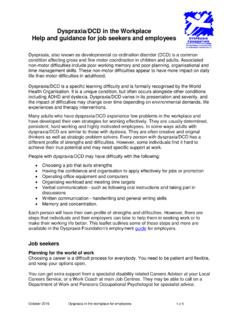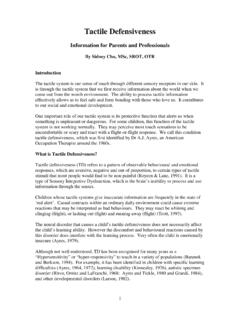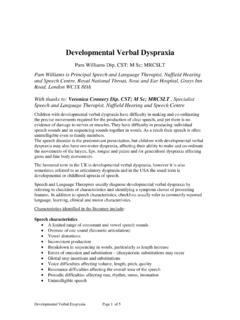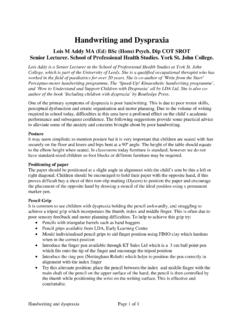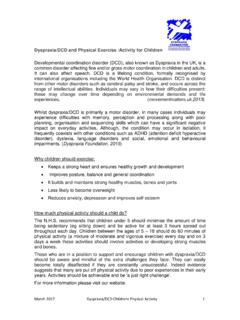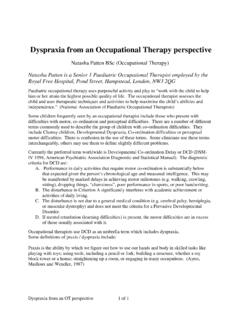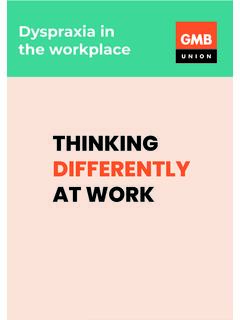Transcription of Adult diagnosis of dyspraxia/Developmental Coordination ...
1 Adult diagnosis of dyspraxia /DCD August 2015 Page 1 Adult diagnosis of dyspraxia / developmental Coordination Disorder (DCD) What is dyspraxia /DCD? dyspraxia is a common disorder affecting fine and/or gross motor Coordination in children and adults . This lifelong condition is also known as developmental Coordination Disorder (DCD), a condition that is formally recognised by international organisations including the World Health Organisation.
2 dyspraxia /DCD is distinct (separate) from other motor disorders such as cerebral palsy and stroke and occurs across the range of intellectual abilities. Individuals vary in how their difficulties present and their difficulties may change over time depending on the situation and the person s life experience. An individual s Coordination difficulties can affect their participation and performance of daily life activities at home, in education, at work and in social settings. Children often present with difficulties with self-care skills, writing, typing, riding a bike and play, as well as other educational and recreational activities.
3 In many cases these difficulties continue into adulthood, also affecting a person s ability to learn new skills such as driving a car or DIY. Although dyspraxia /DCD may occur in isolation, the condition frequently coexists with other conditions such as autism, Attention Deficit Hyperactive Disorder (ADHD), dyslexia, language disorders and social, emotional and behavioural impairments. These co-occurring difficulties can have a serious negative impact on daily life, affecting a person s employment and educational experiences.
4 The dyspraxia Foundation recognises many people with dyspraxia /DCD experience difficulties planning, organising and carrying out movements in the right order in everyday situations. While DCD is often used as an umbrella term to describe a person s motor difficulties, we use the term dyspraxia to refer to those people who have additional non-motor problems such as poor memory, perception, processing speed, planning, organising and sequencing skills. When combined with poor motor Coordination , these difficulties can have a significant negative impact on everyday life and social/emotional well-being.
5 dyspraxia /DCD is estimated to affect 5% of the population, 2% severely. In addition to the difficulties listed above there may also be difficulties with: Fine muscle control which may cause problems with writing, binocular focus of the eyes, or control of speech muscles. Gross motor difficulties may show up when learning to ride a bicycle or a car, and when keeping balance on a bus. Perceptual difficulties might make it hard for a person to interpret information through the senses: the world may feel too bright, too loud or too fast causing overload, stress, depression, anger or panic attacks.
6 Adult diagnosis of dyspraxia /DCD August 2015 Page 2 Organisational difficulties at home and in the workplace affecting time and task management, keeping things in order, remembering instructions. It is important to remember that not all adults with dyspraxia /DCD fit exactly the same description: everyone is different. On the plus side, adults with dyspraxia /DCD can be very creative, empathetic, hardworking, persistent, direct and honest. How and when to seek an assessment for dyspraxia / DCD The type of assessments that are appropriate for use with adults with will depend on the purpose of the assessment.
7 Currently there is no gold standard tool for diagnosing dyspraxia in adults , however, the Adult DCD checklist may be used as a starting point. This is free to download and can be found here: General Practitioners. If you think you may have dyspraxia /DCD it is important to seek a medical opinion so that other possible causes of your symptoms can be eliminated. Unfortunately there are no nationally-agreed guidelines for the diagnosis of dyspraxia /DCD in adults . General Practitioners1 (GPs) are advised by the British Medical Association (BMA) to refer over 16 s with dyspraxia to an Occupational Therapist (OT) for support so ask your GP to refer you to your local Adult OT service.
8 Occupational Therapists are interested in helping people to better manage the activities that make up their daily lives at home, at college, in the workplace and/or in other settings. They will look at both the motor and non-motor factors that make activities a challenge and will help you to come up with solutions to the problems that affect you most in your daily lives. Low self-esteem, stress, depression, anxiety can be the result of trying to cope with dyspraxia /DCD.
9 An OT assessment can examine the sensory stressors you are coping with, providing you with practical strategies to help with stress and mental health problems. Funding for an assessment can be problematic as services for adults with dyspraxia /DCD may not be available via the NHS. Some local charities may help you to fund a private assessment if you have an educational need but this will need research on your part. Fees for an independent assessment vary but currently range from several hundred pounds to over a thousand pounds.
10 To find a private Occupational therapist in your area visit for Directory of Independent Occupational therapists and a help line. An assessment by an OT or educational psychologist for practical advice before going to college or university will enable appropriate adjustments and support to suit your learning style to be identified (see our factsheet for Further/ Higher Education for more details). An assessment might enable students to access Learner Support Funding or the DSA (Disabled Students Allowance).

